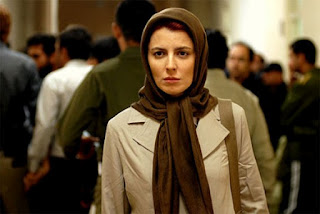There are few movies which remain
etched in the collective conscience of its audience long after they have been
watched. These movies provoke thought, elicit questions and provide no easy
answers. A Separation, the Iranian
film which won the Academy Award for the Best Foreign Language Film at the 2012
Oscars, is one such movie.
A Separation is a courageous attempt, given the circumstances of
cultural and artistic repression that exist in Iran. It is a movie about a
crumbling marriage between Simin (Leila Hatami) and Nader (Peyman Moaadi). Simin
wants to leave the country in order to create a better life for their daughter Termeh
(Sarina Farhadi), but Nader is committed to staying back in Tehran to look
after his ailing father who is suffering from Alzheimer’s. In the opening
scene, the couple looks directly into the camera and pleads their case to a
judge, an imaginary substitute for the audience. It is this incident that
precedes the dissolution of their marriage and triggers off a series of events.
Director Asghar Farhadi
Film trailer
Nader hires a maid named Razieh
(Sareh Bayat), a deeply pious woman, to look after his father. Razieh has a
young daughter and is carrying another child along the way. She works to ease
the financial burden of her debt-ridden husband. However, after a fateful
incident, she loses her child. Subsequently, the characters in the movie grapple
with law, religion and human sentiment to find out who should be held
responsible for the loss of the child.
When A Separation is placed in the context of the Iranian New Wave, one
can see a metamorphosis of this cinematic movement which began in 1969. Gone is
the world of Majid Majidi, Kiarostami or Jafar Panhai, where we see reality from
the redeeming and innocent eyes of children.
The director Asghar Farhadi’s
camera work is to be admired and studied. The mis-en-scence is crafted to
externally depict the inner conflicts of the characters. The editing of the
film, with ample cut aways and jump cuts is perfect and seamless. The shots
also depict the class conflict that exists in Tehran, represented by the differences
in the colourful and upper-middle class apartment of Nader to the run-down and
poverty-ridden residence of Razieh.
- Parinitha Shinde









A Separation manages to touch every human on an emotional level. In spite of the length, the film manages to gain the audience's attention. Brilliant editing and the acting are the USP of the movie.
ReplyDeleteWell written Parinitha :) And now i am eager to watch this film...., will do it soon... And thank you Fr. Melwyn for such a wonderful initiative. We all the film lovers are really very grateful to you.
ReplyDeleteIts a great read Parinitha! Always like to read your articles. And, ya now I understood whats Mis.en.Scene :) Keep writing to inspire my kind of souls!
ReplyDeleteApart from the crumbling marriage and the class conflict, I thought the director showed incredibly the pain and anguish a child can go through when they live with a single parent. Keeping in mind the escalating number of divorces across the globe, the director manages to convey his message that it is always better for the parents to stay together for a bright future of their children!
ReplyDeleteWell written.. good read.. Keep it up..:)
ReplyDeleteWhat struck me most in the movie, was the highly nuanced portrayal of characters. They have a life of their own, and at no point in the film, did I think, 'Ah, I thought so!'The last scene I thought was a masterpiece- poignant and yet teasing the viewers. Every character appears real, and complex, and I could'nt help identifying real people I knew, and real marriages with the ones shown in the movie. It does make us think, again, what marriages mean, and what divorce does. There are no simple answers.
ReplyDelete